COVID Vaccines Briefly Worsen CAD Symptoms in Woman in Case Study
Written by |

Symptoms of cold agglutinin disease (CAD) worsened for a 57-year-old woman two days after receiving the first dose of a COVID-19 vaccine, and again two days after the second dose, a case study from Spain reported.
In both instances, prednisone’s use eased her symptoms and restored normal values to blood tests.
“Hemolytic Crisis due to COVID-19 Vaccination in a Woman with Cold Agglutinin Disease” was published in the American Journal of Hematology.
CAD is a rare autoimmune disease in which harmful self-reactive antibodies, called cold agglutinins, bind and destroy red blood cells at low temperatures. The disease may be considered primary when its cause is unknown, or secondary when it is associated with other underlying medical conditions.
The women, a Caucasian, was diagnosed with primary CAD in 2016. At diagnosis, she showed weakness, fatigue, jaundice (when skin and the whites of the eyes turn yellow) and acrocyanosis — a blueish discoloration of the skin, due to blocked small blood vessels — that can be common in people with CAD.
Blood tests showed signs of anemia and red blood cell clumping (agglutination). She also was positive for complement C3 protein, a key member of the body’s innate complement immune system, found with the direct antiglobulin test (DAT), which measures whether, and to what extent, red blood cells are covered with antibodies.
No signs of infection or cancer were detected in a whole-body CT scan.
Her symptoms eased after short-term treatment with corticosteroids, with no need for additional therapies or blood transfusions.
Over the five years since that initial treatment, she presented from time to time with mild anemia that occasionally required prednisone, a corticosteroid, to control flares.
During the COVID-19 pandemic, the woman, who worked in a nursing home, was followed closely every three months. Lab analysis showed mild red blood cell destruction, she did not experience fever or other symptoms associated with the viral infection.
She received the first dose of a COVID-19 mRNA-based vaccine in January. Of note, these vaccines present a messenger RNA (mRNA) — the blueprint that cells use to make proteins — carrying the instructions needed to make a specific protein (antigen) of SARS-CoV-2, the virus that causes COVID-19. These vaccines work by eliciting the body’s immune system to mount an immune response against the viral antigen.
Two days after that first dose, the patient experienced chills, weakness, shortness of breath upon exertion, back pain, jaundice, and mild hemoglobinuria — the abnormal presence of hemoglobin, the protein that carries oxygen in red blood cells, in the urine.
Lab tests showed alterations in her hemoglobin levels, the presence of immature red blood cells (reticulocytes) in the blood, as well as abnormally high levels of bilirubin and lactate dehydrogenase (LDH), all common signs of CAD. Levels of inflammation markers, such as ferritin or D-dimer, were also elevated. (Bilirubin and LDH are both markers of red blood cell destruction.)
Additional tests found no signs of infection, including SARS-CoV-2. The woman was treated with a daily dose of prednisone (20 mg), and her blood parameters returned to normal values.
A week before a scheduled second vaccination, her daily dose of prednisone was cut by half (10 mg) to avoid dampening her immune response. Two days after this dose, she again came down with the symptoms that followed the first vaccination.
Treatment with a normal daily prednisone dose resumed (20 mg), again easing her symptoms and normalizing lab parameters. The corticosteroid was gradually tapered, and then discontinued.
Increasing evidence supports the link between SARS-CoV-2 infection and the onset of autoimmune disorders in genetically predisposed patients, the case study noted.
“The molecular similarity between the pathogenic [disease-causing] viruses and human proteins seems to play a crucial role in these autoimmune phenomena,” its researchers wrote.
For example, studies suggest that a viral protein, called spike glycoprotein, is very similar to certain human proteins, including one found on the surface of human red blood cells. This could explain why the vaccine against SARS-CoV-2 triggers symptom worsening in patients with autoimmune diseases, such as CAD.
Otherwise, “with millions of doses of the different vaccines inoculated to date, the SARS-CoV-2 vaccines have demonstrated a very good safety profile,” the researchers wrote.
“As with SARS-CoV-2 viral infection, [however,] it appears that they may trigger some autoimmune manifestations in predisposed subjects or those with previously known autoimmune diseases,” they added.
They recommended that “preventive strategies” be evaluated “to ameliorate this risk in predisposed patients,” as vaccinations against the SARS-CoV-2 virus are “going to be administered to the entire population in an unprecedented short-term mass immunization strategy.”
Investigators also advised that patients with CAD and other autoimmune disorders that lower red blood cell numbers should closely monitor their symptoms after being vaccinated.




